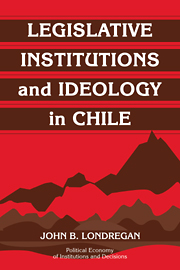Book contents
- Frontmatter
- Contents
- Acknowledgments
- Introduction
- 1 Ideology and Valence
- 2 Accident and Force
- 3 Legislative Institutions in the Constitution of 1980
- 4 Roll-Call Votes and Senate Committees
- 5 The Labor Committee
- 6 The Education Committee
- 7 The Constitution Committee
- 8 Legislative Politics and Chile's Transition Toward Democracy
- Conclusion
- A Estimating Preferences from Voting Records
- Bibliography
- Index
- Titles in the series
2 - Accident and Force
Published online by Cambridge University Press: 22 October 2009
- Frontmatter
- Contents
- Acknowledgments
- Introduction
- 1 Ideology and Valence
- 2 Accident and Force
- 3 Legislative Institutions in the Constitution of 1980
- 4 Roll-Call Votes and Senate Committees
- 5 The Labor Committee
- 6 The Education Committee
- 7 The Constitution Committee
- 8 Legislative Politics and Chile's Transition Toward Democracy
- Conclusion
- A Estimating Preferences from Voting Records
- Bibliography
- Index
- Titles in the series
Summary
For the first two-thirds of the twentieth century, Chile enjoyed perhaps the most stable democracy in South America. All of this changed in the early 1970s after Salvador Allende became president at the head of a leftist coalition that included both Socialists and Communists. His administration, which came to power by perfectly legal means, sought to carry out socialist policies that created sharp divisions among Chileans, with some embracing his plan for a “Chilean Way” to socialism while others viewed Allende as a stalking horse for an eventual Communist dictatorship. Because the electorate divided fairly evenly between enthusiastic supporters of Allende's Popular Unity (UP) government and its determined enemies, democratic resolution of this conflict was difficult. By the third year of the Allende administration the country was in crisis, with increasing levels of violence and a collapsing economy. At this point the military intervened, as it had done twice before in the twentieth century. But this time several thousand of their real and suspected enemies “disappeared” or were killed, and the armed forces remained in power for over sixteen years.
The crisis of the early 1970s and the long period of military rule that followed had a profound effect on both the ideological climate and the institutional environment. Since the early 1970s there have been two histories of Chile.
- Type
- Chapter
- Information
- Legislative Institutions and Ideology in Chile , pp. 50 - 81Publisher: Cambridge University PressPrint publication year: 2000

